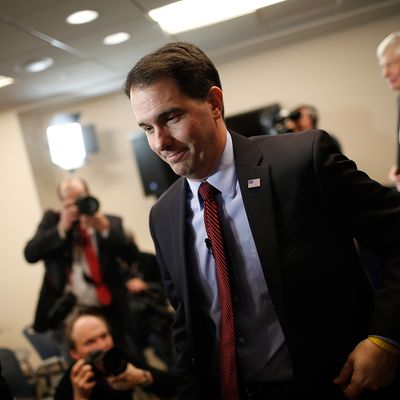
Scott Walker was not planning to outsource the job of defining his presidential campaign to Rudy Giuliani, a last-minute add-on to his New York speaking appearance. But that is exactly what transpired. While unplanned, Giuliani expressed a question of fundamental importance within the Republican Party, which allowed Walker to define himself unmistakably.
Giuliani defends his original claim in a Wall Street Journal op-ed today. In it, Giuliani argues that Obama is “criticizing his country more than other presidents have done, regardless of their political affiliation,” and likewise fails to express “a fundamental belief in the country’s greatness and the example we set for the world.” Both these claims are false. Previous presidents have criticized American historical failures and misdeeds as sharply as Obama, or even more so. Likewise, Obama has repeatedly emphasized his belief in America’s uniqueness and contributions to world peace.
But to conceive of this “debate” in the most literal terms misses all its importance. The question at issue is the right-wing conviction that Obama represents a unique and alien threat to American life. Versions of this belief have held, in descending increments of paranoia, that Obama concealed his overseas birth, that he has concealed his religious beliefs, and that he is vaguely plotting to harm America. Rush Limbaugh openly confessed to rooting for Obama to fail, his reasoning being that Obama was not actually trying to restore economic health — his goal was to weaken the free enterprise system in order to instill government social control. (“Democrats want to destroy this economy to their benefit, to create more and more poverty, to create more and more homelessness, to create more and more dependency on the federal government.”) The conviction has important strategic implications for the party. Since Obama did not merely believe in different policies but was pursuing a secretive and sinister agenda, it followed that there was no point in negotiating with Obama at all. And this is the strategic course most Republicans followed.
The significance of the debate is the signal it sends about Walker’s relationship to the base. Other Republican candidates have distanced themselves from inflammatory questions about Obama’s patriotism (or his true religious beliefs, which Walker likewise declined to ascertain, before letting his press secretary issue a pro forma statement that Obama is a Christian).
Walker has spent the last several days defining his place on the political spectrum. He courted Grover Norquist and Norquist’s allies, who are seeking a more conservative challenger to Jeb Bush, whom they distrust for his refusal to sign Norquist’s pledge to refuse any tax increase of any size under any conditions. He has likewise taken a more uncompromising tone on abortion and immigration.
While paranoid suspicions about Obama are not a direct policy issue, they serve as a proxy for positioning within the Republican Party. The reaction of fellow conservatives bears this out. Lindsey Graham, a Republican senator who has tried without success to broker deals with Obama on climate, immigration, and other issues, unambiguously contradicted Giuliani. (“I have no doubt that he’s a patriot.”) Bobby Jindal, who is trying to carve out an identity as the spokesman for the right, has gone to comical lengths to attach himself to Giuliani’s sentiments — first issuing a formal statement through his spokesperson that he would not condemn Giuliani, even though nobody asked, and then, when that failed to yield the hoped-for reaction, writing Giuliani a letter of congratulations. Jeb Bush and Marco Rubio both issued statements disavowing any questions of Obama’s motive, in keeping with the mainstream profiles they are trying to cultivate.
Walker dismissed the question of Obama’s religion as a gotcha game by campaign reporters fixated on trivia. It is certainly inconvenient for Republican candidates to face questions that force them to define their relationship with the most stark-raving-mad beliefs of the conservative base. But that relationship is the most important question the candidates will navigate, both during their campaign and while governing. Free-floating paranoia is not an esoteric point of trivia; it is a central feature of conservative-movement thought. Perhaps by mistake, Giuliani made the last several days the most edifying time of the campaign so far.






























